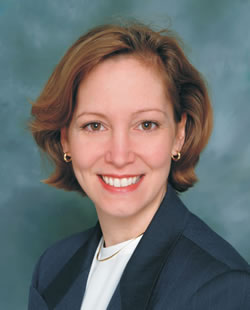Remarks by the APS Director of International Affairs
Amy Flatten

- the Brazil-U.S. Exchange Program,
- the India-U.S. Travel Program, and
- the International Travel Grant Award Program.
Information on these awards is available on our Travel Grants & Lectureships web page. We hope that you will apply for these wonderful opportunities.
For this article, I especially welcome the chance to inform the FIP members of an exciting new initiative, led by the APS Office of International Affairs — The “U.S.-China Young Physicists Forum” (YPF) that will be held February 28 and March 1, 2015, in San Antonio, Texas. The event is cosponsored by the American Physical Society (APS) and the Chinese Physical Society (CPS) as part of a larger effort to strengthen communication and collaboration between the U.S. and Chinese physics communities.
Leaders of both APS and CPS have underscored the importance of building connections among younger scientists, and have been working to build joint programs for graduate students from their respective countries. The APS March Meeting, which attracts 9,000-10,000 physicists worldwide, provides an ideal venue for bringing together graduate students from the United States and China for a combination of scientific-focused sessions with career development and networking opportunities. As many graduate students from China will already plan to attend the 2015 March Meeting in San Antonio, Texas, APS and CPS will hold the U.S.-China YPF the weekend before the 2015 March Meeting begins. The program will especially encourage participation by U.S. graduate students who have had little or no experience in China.
The U.S.-China YPF will span a day and a half, with approximately 30 graduate students from each country (~60 total). It will be modeled after the biennial Canadian-American-Mexican Physics Graduate Student Conferences (CAM) that APS has co-sponsored since 2003, with the help of funding from the National Science Foundation. The scientific sessions will focus upon two of the major physics sub-disciplines addressed at the March Meeting: Condensed Matter Physics and Materials Physics.
The U.S.-China Young Physicists Forum (YPF) will combine scientific sessions with career development and networking opportunities for the graduate students, with each country sending ~30 students (~60 total for this meeting).
Through special topical and technical sessions, it will provide graduate students from the United States and China with:- plenary physics sessions from US and Chinese senior scientists
- research presentations by participating U.S. and Chinese students during parallel and poster sessions
- career development discussions on publishing in peer-reviewed journals and careers outside of academia
- networking and social events with leaders in Condensed Matter Physics, Materials Physics, and VIP’s from the APS and CPS
The program especially encourages U.S. graduate students without much prior experience in China to participate in the meeting.
Much like the CAM conferences, senior physicists will present their research in Condensed Matter Physics and Materials Physics, followed by parallel sessions with the graduate students themselves presenting to each other. A poster session and networking reception will allow students to discuss their research in smaller, more intimate settings than the larger March meeting would allow and share interests with not only their international peers, but also with leaders in Condensed Matter Physics, Materials Physics and dignitaries from APS and CPS. All graduate students will be expected to participate scientifically, either through presenting their research during a parallel session, or presenting a poster during the poster session/networking event.
APS 2015 Vice President Laura Greene will provide a session on “Publishing in Peer-Reviewed Journals,” a session that she has given to international audiences of young scientists around the globe. In addition to the scientific presentations and poster session, two panel discussions focused upon professional development and career-building will be tailored to both U.S. and Chinese graduate student interests. These include: “Careers Outside of Academia in the U.S. and China,” and “Life as a Graduate Student in the U.S. and China.”
The plenary and parallel scientific sessions will provide the YPF participants with an expanded view of physics beyond their own classrooms, laboratories, and nation. The panel discussions and networking opportunities will broaden their perspectives on career opportunities outside of academia, and will allow deeper insights into each country’s scientific culture and approaches toward scientific research or partnerships.
Likewise, the relationships formed at this conference have the potential to last throughout the participants' professional lives. As the YPF participants will have already begun attending the annual APS March Meeting, they are likely to maintain connections over the years, as they continue to attending these APS meetings, and other international conferences in Condensed Matter Physics and Materials Physics. Consequently, the YPF has the potential to lead to many fruitful interdisciplinary and/or international networks and collaborations throughout the participants’ careers.
Through this combination of scientific, career development and networking opportunities, the U.S.-China Young Physicists Forum will foster an appreciation for international scientific collaboration among young physics researchers, and promote long-term connections among graduate students from the two countries. These early insights will prepare both U.S. and Chinese physics students for future scientific leadership and international scientific cooperation.
More information regarding participation, registration, abstract submission and the program will be available at the Office of International Affairs website. In the meantime, I would like to ask the members of FIP to share news of the U.S.-China Young Physicists Forum with their colleagues in Condensed Matter Physics and Materials Physics, and to encourage graduate students in these sub-disciplines to participate.
Dr. Amy Flatten is Director of International Affairs at the American Physical Society
Disclaimer - The articles and opinion pieces found in this issue of the APS Forum on International Physics Newsletter are not peer refereed and represent solely the views of the authors and not necessarily the views of the APS.
